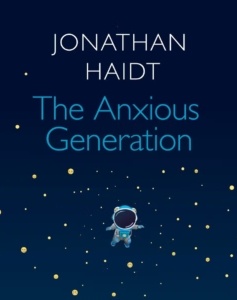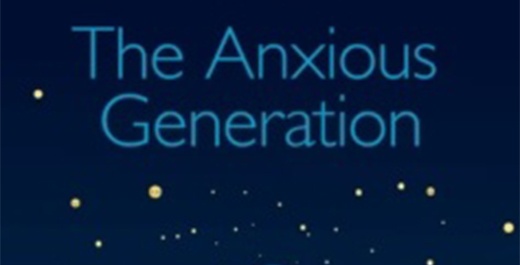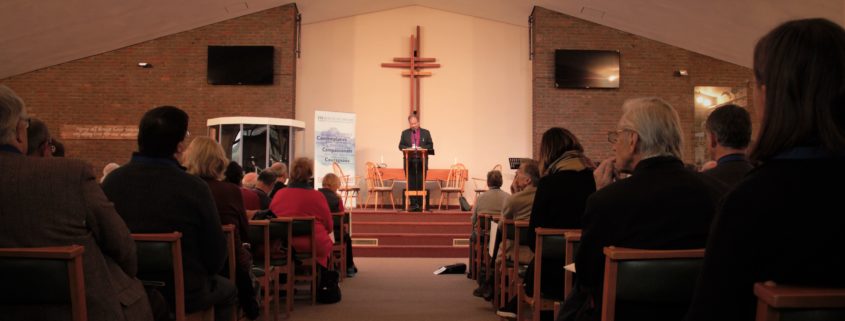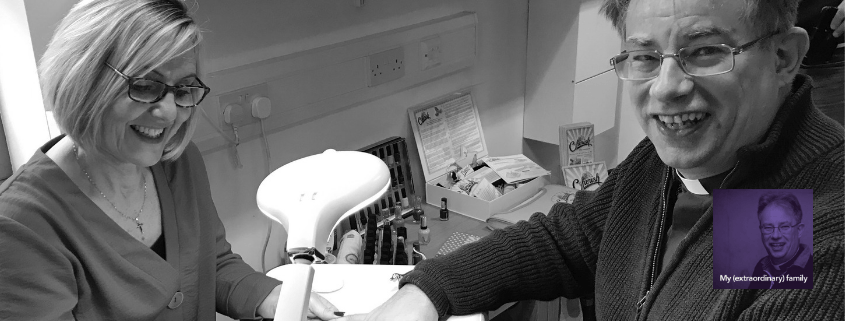The Anxious Generation
Dozens of books are published every year now on the risks of technology and AI. I can only read a fraction and I have to confess I start more than I finish. But every so often I am gripped by a book I can’t put down and then want everyone to read.
The last time that happened was Shoshanna Zuboff’s masterpiece The Age of Surveillance Capitalism in 2019 which exposes the economic and financial models, the risks and exploitation at the heart of Big Tech. It’s not a light read nor a short one at almost 700 pages but foundational to understanding the changes at the heart of the global economy.

The Anxious Generation is more focussed and altogether easier to read and understand – but I would say equally important. Jonathan Haidt is Professor of Ethical Leadership in the Stern School of Business in New York University. He’s a serious academic. More importantly he is also a parent and cares passionately about the wellbeing of young people.
His book deserves to be read by every parent and grandparent; by every headteacher; every church leader; every politician. It’s a cool-headed, factual and devastating analysis of what has happened to the mental health of children and young people since 2010. It’s also a cry for radical reform in relation to children, schools, smart phones and social media.
Life on Mars
Haidt begins and ends his book with a parable: “suppose when your first child turned 10 a visionary billionaire whom you’ve never met chose her to join the first permanent human settlement on Mars?”. Would you agree? Of course not. But what has happened to children and young people over the last 14 years has been the equivalent: a set of experiences Haidt calls the Great Rewiring.
The Great Rewiring happened in 2010 with three global developments in technology. The first was the widespread adoption of the smart phone with thousands of apps. The second was the invention of the front-facing camera and the arrival of the selfie. The third was the rise of social media, driven by algorithms and especially the like and retweet/repost buttons. The Anxious Generation is not a diatribe against technology as such, or the internet, or computer games but an analysis of what has happened to children and young people as a consequence of these key and almost universal developments.
Previous studies have demonstrated a correlation between the sharp rise in anxiety and mental health issues and social media. Haidt claims to take the evidence a step further and demonstrates clear causation. I was completely convinced by his arguments which underlined so much of what I learned during the long passage of the Online Safety Bill through Parliament. Some of his reviewers do still question his evidence base but the book is supported by a website with tables of statistics and updates for those who want to follow through on this.
Haidt follows through on his general analysis with more detailed studies of the differential effects of social media on boys and girls. These are probably the most chilling and serious chapters in the book. He sets the widespread use of social media in the context of an equally serious long-term trend: under supervision of children online combines with over supervision in the real world with fewer opportunities for real life play and experimentation has produced the current sharp rise in anxiety, unhappiness, self-harming and suicidal thoughts with tragic consequences for a generation.
The Prescription
Haidt’s prescription and call to action are specific and clear and undergirded by every argument in the book. He makes four recommendations:
• No smart phones before high school (aged 14)
• No social media before 16
• Phone-free schools
• Far more unsupervised play and childhood independence.
Haidt demonstrates convincingly that the minds of young teenagers are still developing until the age of 16 and young teens are simply unable to resist the addictive behaviours taught by the algorithms which drive social media. Social media is therefore positively dangerous in forming addictive habits before the age of 16. He also demonstrates that the current social media threshold of 13 (ignored by many children and parents) is entirely arbitrary and has no basis in medical research. By phone-free schools he means more than no phones visible in lessons but a system whereby phones are locked away securely at the beginning of the school day and not unlocked until the end. The Times carried an article on 9 April exploring the radical difference this has made in one school in Kent.
Haidt’s conclusions are relevant to every school governor, every teacher and every parent in Britain. Young children want smart phones and are often given smart phones from the age of eight or nine. It’s currently considered normal to give your child a smart phone at the latest by secondary school with access to all the social media apps. It takes a determined parent and school to stand against the trend. But Haidt’s analysis speaks for itself. The current socially accepted norm is deeply damaging to the mental health of a whole generation.
Spiritual Practices
One of the most fascinating chapters in The Anxious Generation is the section on spiritual practices. Haidt himself is an atheist but he writes as someone who appreciates and sees the value of traditional spiritual practices for mental health. He outlines six which he believes are significant:
1. Shared sacredness (times and places set apart)
2. Embodiment and real-world experiences
3. Silence, stillness and focus developed by prayer and meditation
4. Transcending the self in worship
5. Be slow to anger and quick to forgive (the opposite to habits developed by social media) and
6. Find awe in nature.
This is an excellent list for churches and church schools to reflect on and to develop further. As a diocese we have done a huge amount of work in this area through SpaceMakers, our contemplative toolkit for schools to teach exactly these and other spiritual disciplines.
What can schools and churches and chaplaincies do?
The Anxious Generation is a vital book. Read it for yourself and recommend it to others. We are in the midst of a mental health pandemic and not just for children. Many of Haidt’s lessons apply equally to adults addicted to their phones, constantly checking into social media and unable to focus on any single thing for more than a few minutes.
Churches are well placed to form communities of resistance to technology addiction for both adults and for children and young people. Draw people together. Host conversations. Get medical experts in. Develop strategies together.
School heads and governors have key responsibilities here to ensure that church schools are places of safety and learning. That will mean taking very seriously the call to ban smart phones during the school day though decisions need to be carefully made and prepared for.
We have scores of chaplains across the diocese working in universities, the armed forces, prisons and other settings with a generation of young adults already addicted to technologies but also beginning to look for ways to grow stronger.
Looking back from the future
I am convinced that in 10 or 20 years’ time, the world will look back in anger at our carelessness in exposing children and young people to addictive technologies, harmful content and permanent distraction through what Haidt calls the Great Rewiring of childhood and adolescence. It is time to wake up to the reality of the crisis in child mental health and its causes. Jonathan Haidt’s book is a really significant step forward – but we need to take action together.








